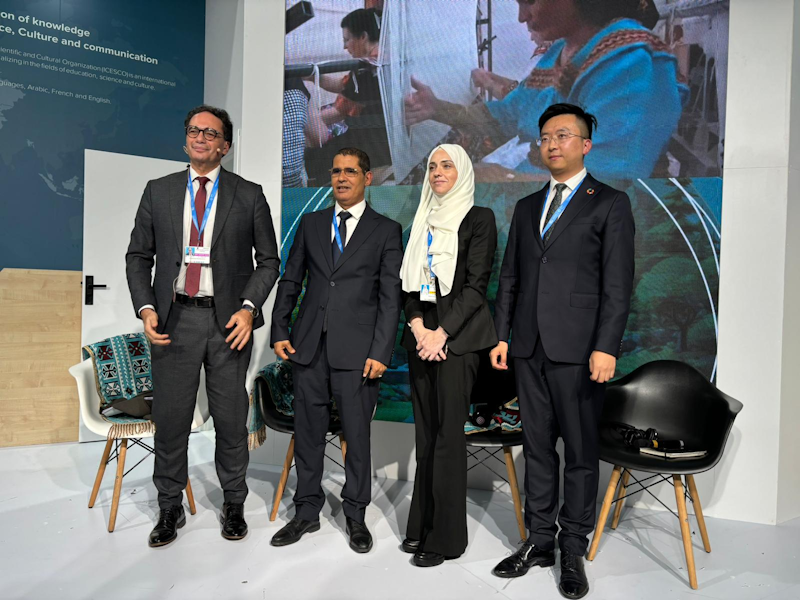The Past as Our Guide: Experts at COP29 Redefine Heritage as a Climate Solution
Dr. Mohamed Zinelabidine, Dr. Nami Salihy, Dr. Rahaf Ajaj, Mr. Yubo Zhai
Dr. Rahaf Ajaj, Senior Advisor for Environmental Health and Innovation and the WiRE UAE Chapter Leader
BAKU, AZERBAIJAN – At the heart of COP29's climate policy discussions, a new narrative took center stage: cultural heritage is not merely a victim of climate change, but a powerful resource for building a resilient and sustainable future. This was the central theme of the event, "Resource Opportunities for Mitigating Impact of Climate Change on Heritage," held on November 14, 2024, at the ICESCO pavilion.
A New Perspective on Climate Action
The panel, moderated by Dr. Mohamed Zinelabidine, Director of Culture Department at ICESCO, brought together a diverse group of experts to explore a holistic, three-pronged strategy for climate action. The consensus was clear: the path forward lies in a blend of traditional knowledge, innovative technology, and global collaboration.
The Power of Traditional Wisdom
Among the notable speakers was Dr. Rahaf Ajaj, the WiRE UAE Chapter Leader, whose expertise in health sciences and energy generation provided a unique perspective on the intersection of human well-being and climate-resilient systems. The discussion underscored the importance of leveraging existing resources, particularly the vast and often underutilized knowledge of traditional and Indigenous communities. Panelists shared compelling examples of age-old practices in land management and architecture that have proven to be effective in withstanding climate threats. They also highlighted the economic value of heritage, arguing that sustainable tourism can generate the necessary funds for conservation.
The Role of Technology and Economic Innovation
The conversation then pivoted to the imperative of adopting new strategies. The panel explored the need for innovative financial mechanisms, such as targeted grants, to address the immense costs of protecting historical sites. Dr. Zinelabidine and the other panelists also delved into the role of digital technologies, showcasing how tools like 3D scanning are being used to create "digital twins" of at-risk sites. This vital work ensures that invaluable historical and cultural information is preserved, even in the face of physical destruction.
The Call for Global Cooperation
A recurring theme throughout the discussion was the critical need for collaboration. The panelists—including Eng. Mohammed Al-Aidarous, Chairman of the Islamic World Heritage Committee; Dr. Ammar Kessab, PhD, Principal Governance Officer at the African Development Bank; Dr. Nami Salihy, Director of World Heritage Site; and Mr. Yubo Zhai, Assistant to the Chairman & General Manager of ESG and Sustainability of Newlink—all called for breaking down the traditional silos between heritage conservators, climate scientists, and policymakers. They emphasized the importance of creating global platforms for knowledge exchange, ensuring that best practices and successful adaptation strategies can be shared, especially with the world's most vulnerable regions.
A Paradigm Shift: Heritage as a Climate Solution
The event’s overarching takeaway was a powerful paradigm shift: cultural heritage is a valuable asset in the climate change solution, not simply a casualty. By combining the wisdom of the past with the innovations of the future and a spirit of global cooperation, the world can safeguard its shared cultural legacy while simultaneously building a more resilient and sustainable future for all.
Learn more about https://icesco.org/en/
Written by:
Andrew Osawe,
Director of Operations,
Women in Renewable Energy (WiRE)



